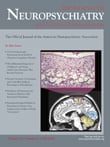To the Editor : Nicotine is possibly one of the most prevalent dependence-producing drugs because of the central nicotinic-cholinergic, dopaminergic, serotonergic, and gabaminergic pathways with which it has been associated.
1 Nicotine-dependent behavior may conceivably be reinforced by the drug’s focus and memory enhancing properties,
2 as well as antidepressant,
3 anxiolytic,
4 and appetite-suppressing properties.
5 Nicotine is a unique paradigm in that it suppresses appetite and stabilizes mood. Nicotine withdrawal leads to the emergence of craving in dependent individuals, which can include impaired memory
6 and concentration, depressed mood, anxiety, and increased appetite.
7 Although less clearly understood than nicotine withdrawal, food-seeking behavior also is believed to involve an array of neuropsychiatric reward pathways. Nicotinic-cholinergic,
8 dopaminergic,
9 serotonergic, and GABA-ergic
10 reward systems are among the likely candidates that motivate us to eat. Food-seeking has been associated with depression, stress, and emotional discomfort,
11 and food tasting alone can stabilize mood.
12Varenicline is a new treatment for nicotine dependence and a nicotinic-cholinergic receptor partial agonist that behaves like nicotine. We report a case of varenicline-associated appetite suppression and weight loss accompanied by improved mood.
Case Report
Ms. A, a 66-year-old white woman, was referred by another patient in November 2006 for alcohol, depression, anxiety, panic, and chronic pain from pedal peripheral neuropathy of unknown etiology. Ms. A met DSM-IV-TR criteria for alcohol dependence and cyclothymic disorder. Duloxetine, 30 mg, was started for depression and pain management, and gabapentin, 900 mg, for alcohol detoxification and craving reduction, as an anxiolytic and mood stabilizer, and for pain. Gabapentin was raised eventually to 1600 mg daily and her level of functioning improved in the face of enormous stress associated with her disabled son and her ex-husband. She relapsed in February 2007 by having a drink of vodka every few days. She was adamantly opposed to Alcoholics Anonymous and residential alcohol detoxification and rehabilitation programs. She stopped drinking by mid-March and remained abstinent for about 3 months. Then, according to Ms. A, overwhelming amounts of stress led her to slip, and by the beginning of July she was consuming six to eight drinks daily. Ms. A was prescribed varenicline, 1 mg twice daily, and was instructed to eat a low-acid meal with an eight-ounce glass of water before taking the medicine, as a means of curtailing her drinking. She returned a week later, with the same magnitude of problems, and proudly reported she had lost five pounds (down to 160, BMI=28); had stopped drinking alcohol; had regained her energy, ambition, focus, memory, and more pleasant mood; no longer had transient facial tics; and had noticeably less tension in her face. The only persistent side effect was mild nausea, which was ever-present but did not discourage her from continuing with the varenicline. A week later, she had lost an additional three pounds, still was not drinking, and was enjoying newly reacquired cognitive and behavioral benefits. Ms. A lost two pounds by the end of the third week, bringing her BMI down to 27.
Comment
Though minimal, the placebo effect cannot be ruled out, nor can the possibility of a synergistic therapeutic benefit among the three medicines. Another possibility is that varenicline works like nicotine to suppress appetite, cause weight loss, and stabilize cognition and mood. This case report does suggest that the new selective alpha4beta2 nicotinic-cholinergic receptor partial agonist is perhaps a more promising clinical psychopharmacologic prototype for appetite suppression and weight reduction because, unlike many other diet pills, varenicline may improve cognition and mood rather than causing disturbances that require discontinuation. The appetite/obesity-varenicline interface warrants further investigation, using larger groups of subjects and more sophisticated study design, not only as a novel treatment but also to help unravel the unsolved neuropsychiatric puzzle behind the brain disease commonly known as obesity.

